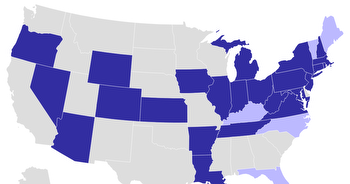Online Casino Markets Grow in Some US States but Fail to Gain Traction Nationally
There is no uniform position concerning online casinos in the US. Regulatory decisions are made at the state level. State governments regulate various aspects of the online casino landscape, including which games are permitted, whether geolocation restrictions apply, and what licensing requirements are implemented.
New Jersey was the first state to legalize online casinos in 2013. Governor Chris Christie signed the legislation allowing this. Since then, the US online casino industry has grown further.
several states have now legalized online casinos. These states are Connecticut, Delaware, Michigan, Pennsylvania, West Virginia, and Rhode Island, which was the latest state to do so.
The law permitting online casinos in Rhode Island was introduced in 2023 and took effect on March 1, 2024. The 1.1 million residents of the state can now play simulcast table and slot games provided by Bally’s Twin River Casino in Lincoln.
Although seven states have introduced laws permitting the operation of online casinos, the expected boom in legalization throughout the US has not happened. In fact, only Connecticut and Rhode Island have introduced associated laws since 2021.
Recently, the expansion of online casinos has been especially limited. Politicians in some states have made efforts to introduce legislation, with no significant impact. For example, attempts in New Hampshire in 2023 failed and have yet to be reignited.
In Maryland, there is a similar story. In 2023, attempts were made to introduce a bill that lawmakers admitted was more a means of starting a conversation than something they expected to come to fruition.
The reasons for the lack of regulated online casinos in most states are uncertain. After all, the New Jersey market’s annual revenue is an impressive $400 million, which would seem to make the potential of a regulated market attractive.
One potential reason for a lack of traction nationally is the fear that Internet gambling could reduce the number of people visiting land-based casinos. This belief certainly played a role in decisions made in Maryland, where research indicated a potentially negative impact on land-based venues if online casino sites were legalized.
A further possible reason for the lack of interest in legalized online casinos in many states is the decision by state governments to concentrate on introducing legalized sports betting, which was enabled by the Supreme Court decision of 2018. The emphasis on this form of gambling means that 38 states now have legalized sports betting, with 29 states permitting online sports betting. The District of Colombia also permits land-based and online sports betting.
The combination of these two potential reasons has likely impacted the extension of legal online casinos to more US states. Whether this continues to be the case is uncertain. Many proponents of industry growth believe that the end of federal pandemic stimulus funding will prompt state governments to seek additional funds from elsewhere. In doing this, they may become more receptive to legalizing online casinos as a source of tax revenue.































